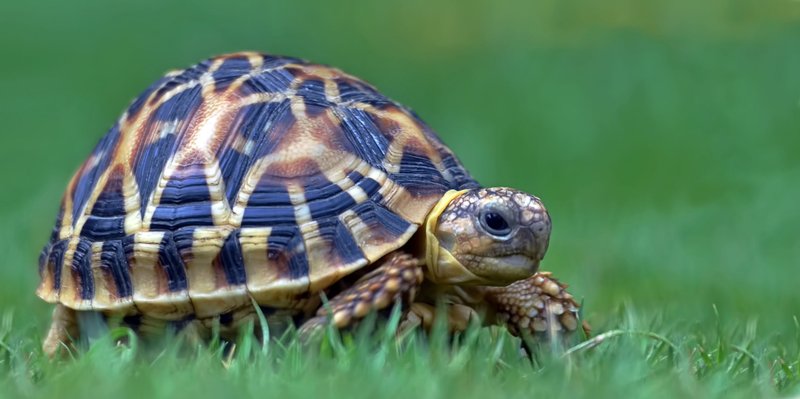
The Indian Star Tortoise, native to the dry forests of India and Sri Lanka, has become a favorite among reptile enthusiasts. Its unique shell pattern and relatively small size make it appealing, especially for those new to tortoise care. But are they easy to manage? Let’s dive into what you should know about keeping an Indian Star Tortoise, and whether or not they are the right fit for you as a beginner.
Understanding the Basics of Indian Star Tortoises
To start, it’s important to grasp what makes the Indian Star Tortoise unique. These tortoises can grow to be about 10 to 12 inches long, making them manageable for beginners. They have a striking pattern on their shells, resembling stars—hence the name! This not only adds to their beauty but also makes them a conversation starter.
Caring for a tortoise involves more than just admiring its looks, though. These creatures have specific habitat requirements and dietary needs. They’re herbivores, meaning their diet consists mainly of leafy greens, fruits, and vegetables. You might be wondering if you can just feed them anything—unfortunately, that’s not the case! A balanced diet is crucial for their health.
As a beginner, you should also be aware that these tortoises can live for decades. Some can even reach up to 100 years if cared for properly! It’s almost like adopting a furry friend that’s going to stick around for a long time. This longevity is something to think about when considering whether they fit into your lifestyle.
Setting Up Their Habitat
Creating a suitable habitat for your Indian Star Tortoise is essential. Think of it as building a little paradise just for them! They thrive in warm, humid environments that mimic their natural habitat. A spacious enclosure is a must—ideally, a tortoise table or a large terrarium.
Here are a few key features to include in their setup:
- Heat source: Since they’re cold-blooded, they need a basking area with temperatures between 85°F and 95°F.
- UVB lighting: This helps them synthesize vitamin D3, which is vital for their shell and bone health.
- Substrate: Use organic soil or coconut coir. This allows them to burrow, which they naturally do.
- Hiding spots: Provide logs or caves where they can retreat and feel safe.
Don’t forget to keep the habitat clean! Regular cleaning prevents bacteria and helps maintain a healthy environment for your tortoise.
Feeding an Indian Star Tortoise
When it comes to feeding your Indian Star Tortoise, it’s all about variety and balance. You wouldn’t want to eat the same thing every day, right? These tortoises enjoy a mix of greens, vegetables, and occasional fruits. Some popular choices include:
- Leafy greens like kale, dandelion greens, and collard greens
- Fruits like strawberries and mangoes (in moderation!)
- Vegetables like zucchini and bell peppers
You might be curious about supplements. Many tortoise owners add calcium and vitamin D3 supplements to their diet, especially if they don’t get enough UVB exposure. Just remember to introduce new foods gradually to avoid upsetting their stomachs.
Also, be cautious about overfeeding. While these tortoises can eat a lot, obesity can lead to health issues. It’s all about keeping a close eye on their diet, just like you would with your own eating habits.
Handling and Interaction
When it comes to handling your Indian Star Tortoise, patience is key. They’re not exactly like dogs that crave attention. Instead, they tend to be more solitary and prefer to explore at their own pace. That said, they can get used to gentle handling over time.
Start by offering your hand slowly, allowing them to sniff and get comfortable. Once they’re relaxed, you can gently pick them up. Don’t rush it, though! If they seem stressed, it’s best to let them be. You might be wondering if they enjoy being held—most tortoises prefer their own space and may not appreciate being carried around.
Make sure to provide them with plenty of floor time outside their habitat. Tortoises love to walk and explore, which can be a great bonding experience. Just be sure to supervise them during these adventures, keeping them safe from hazards like stairs or other pets.
Common Health Issues
Like any pet, Indian Star Tortoises can face health issues. As a beginner, it’s important to be aware of these so you can spot any problems early on. Some common issues include:
- Respiratory infections: Symptoms include coughing, nasal discharge, and lethargy.
- Shell rot: This can occur if the habitat is too damp. Look for soft spots or discoloration on the shell.
- Metabolic bone disease: Often related to poor diet or lack of UVB light, leading to soft or deformed bones.
Regular check-ups with a veterinarian experienced with reptiles are crucial. It’s a good idea to find one before you bring your tortoise home. They can help you keep your tortoise healthy and happy, just like a regular doctor would for you!
Final Thoughts
So, is the Indian Star Tortoise good for beginners? The answer isn’t a simple yes or no. For those willing to invest time and energy into their care, they can be a wonderful addition to your home. Their unique looks and relatively manageable size make them appealing, but they come with specific needs that must be met to thrive.
Before making your decision, take a moment to consider your lifestyle and commitment level. With the right approach, an Indian Star Tortoise can be not only a beautiful pet but a rewarding companion for years to come. Just remember, it’s all about creating a loving environment and making sure your new friend has everything it needs to live a happy, healthy life.
